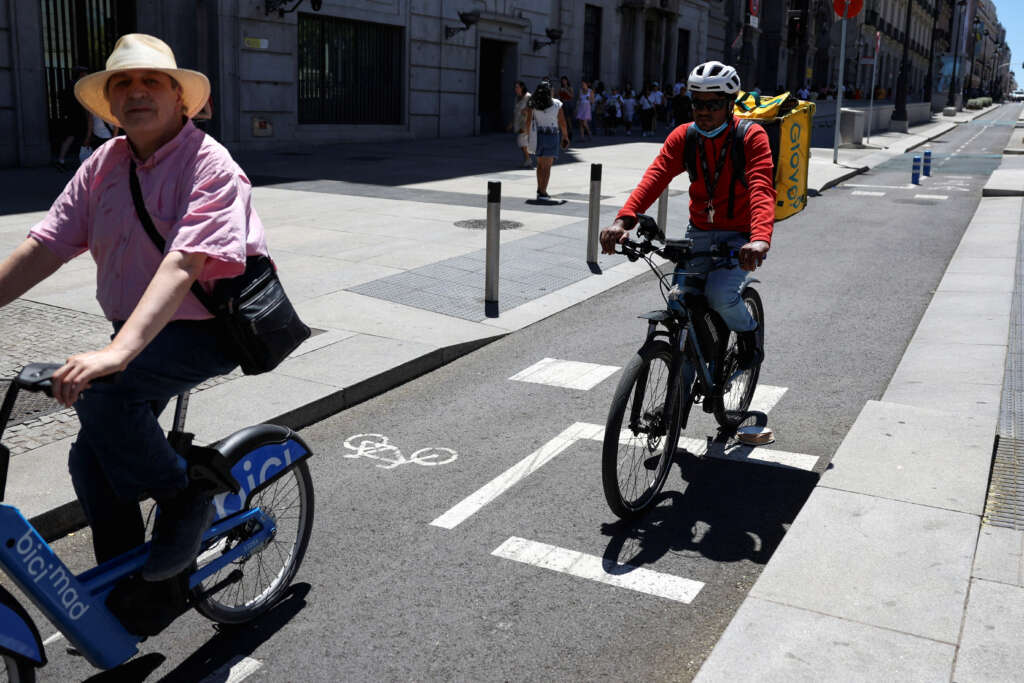
MADRID/VALLADOLID (Reuters) – Aiming to highlight the city of Valladolid’s green credentials, Spain’s Environment Minister Teresa Ribera arrived by bicycle at a European Union climate meeting there last week.
But even as she pedalled to the event along a recently-built bike lane, programmes that have made Valladolid one of Spain’s top cities for green mobility were on the chopping block after a coalition of the conservative People’s Party and the far-right Vox took power there.
They have vowed to reduce its low-emission zone (LEZ) and reroute bicycle and bus lanes to accommodate cars.
Similar plans are being carried out or broached in cities such as Gijon, Castello and Elche after the two parties reached coalition deals following local elections in May.
With polls indicating a PP/Vox coalition government as the most likely outcome of next Sunday’s national election, the reversal signals what could be a broader shift in Spain’s climate change policy.
That could alter the balance in Europe, where the fight over a law to restore degraded ecosystems has shown cracks in support for the EU green agenda. European lawmakers passed it in a close vote on July 12.
Alberto Gutierrez, Valladolid’s new mobility chief, said the city would redesign cycle and bus lanes to improve congested traffic, denying claims by cycling groups that it is a covert way to shorten them.
“We are going to continue building bike lanes,” he told Reuters.
He defended the decision to reduce the LEZ, saying Valladolid already has low pollution levels.
‘ENERGY SUICIDE’
Valladolid resident Miguel Diaz, 26, who works in audiovisual media, said he mainly used buses and a bike to get around the city. Restrictions on cars in the centre did not bother him since it was quicker by bike.
Under the ruling Socialist-led coalition, Spain has been one of the most vocal champions of the EU’s energy transition to net zero carbon emissions, including investing 6.5 billion euros ($7.3 billion) to reduce the use of private cars.
Vox has also pledged to repeal Spain’s climate law, which establishes an obligation to create LEZs in cities. The PP manifesto makes no explicit reference to measures to promote green mobility.
“Bike lanes have to be useful and not generate social alarm, so each municipality has to analyse the most appropriate location,” a PP official told Reuters.
Vox, founded in 2013, has become increasingly hostile to environmental measures. It says it will not use aid earmarked for the United Nations’ 2030 Agenda, which includes sustainable mobility. Vox leader Santiago Abascal has described U.N. climate policies as “energy suicide”.
Trailing the PP in polls, Socialist Prime Minister Pedro Sanchez has sought to exploit the threat the right poses to environmental policies to mobilise his voters.
“They are putting people at the head of city councils and regional governments who by action or mission are climate change deniers,” Sanchez said on July 6.
‘PEOPLE’S POLICY’
Vox’s strategy is aimed at a minority of people annoyed by bike lanes, framing them as part of the culture war, said political scientist Cristina Monge of the University of Zaragoza.
Removing LEZs, most of which have been financed by EU COVID recovery funds, could also affect further transfers to Spain.
City councils considering removing LEZs said they were studying how to avoid having to reimburse Brussels. Valladolid has been awarded 10.6 million euros to create an LEZ and about 4 million for bike lanes.
A European Commission spokesperson said these projects were linked to the fourth disbursement that the next government will have to apply for in the autumn. They declined further comment.
Gijon in northern Spain is another city that is changing tack on urban mobility policies.
Newly-elected Mayor Carmen Moriyon from a local spin-off of the PP, who needed support from Vox to rule, has already changed the layout of bike lanes and removed the obligation for vehicles to have an environmental sticker in order to park in Gijon.
Cars in Gijon, one of the most polluted cities in Europe according to the European Environment Agency, would once again be “free”, she said.
Visiting Valladolid, EU climate chief Frans Timmermans said environmental policies should not be politicised.
“Improving air quality – is that a left-wing policy or a right-wing policy? It’s a people’s policy,” he said. (This story has been refiled to fix the quote attribution to ‘she said’ in paragraph 22)
($1 = 0.8917 euros)
(Reporting by Belén Carreño and Pietro Lombardi, writing by Andrei Khalip and Belén Carreño; editing by Charlie Devereux and Angus MacSwan)


